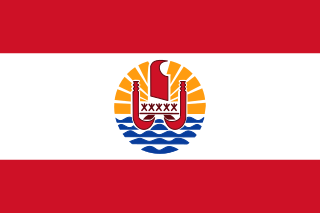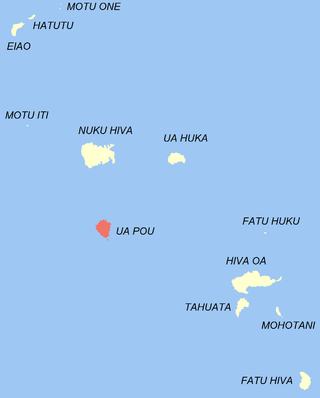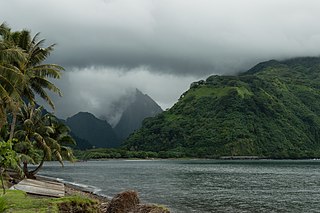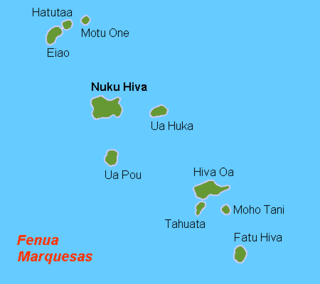
French Polynesia is an overseas collectivity of France and its sole overseas country. It comprises 121 geographically dispersed islands and atolls stretching over more than 2,000 kilometres (1,200 mi) in the South Pacific Ocean. The total land area of French Polynesia is 3,521 square kilometres (1,359 sq mi), with a population of 278,786.

The Marquesas Islands are a group of volcanic islands in French Polynesia, an overseas collectivity of France in the southern Pacific Ocean. Their highest point is the peak of Mount Oave on Ua Pou island, at 1,230 m (4,035 ft) above sea level.

Baracoa, whose full original name is: Nuestra Señora de la Asunción de Baracoa, is a municipality and city in Guantánamo Province near the eastern tip of Cuba. It was visited by Admiral Christopher Columbus on November 27, 1492, and then founded by the first governor of Cuba, the Spanish conquistador Diego Velázquez de Cuéllar on August 15, 1511. It is the oldest Spanish settlement in Cuba and was its first capital.

Fatu-Hiva is the southernmost island of the Marquesas Islands in French Polynesia, an overseas territory of France in the Pacific Ocean. With Motu Nao as its closest neighbour, it is also the most isolated of the inhabited islands.

With its 320 square kilometres, Hiva Oa is the second largest island in the Marquesas Islands, in French Polynesia, an overseas territory of France in the Pacific Ocean. Located at 9 45' south latitude and 139 W longitude, it is the largest island of the southern Marquesas group. Around 2,200 people reside on the island. A volcano, Temetiu, is Hiva Oa's highest point with 1,200 metres.

Ua Pou is the third largest of the Marquesas Islands, in French Polynesia, an overseas territory of France in the Pacific Ocean.
Taha Uku is a small bay on the north shore of Ta‘a ‘Oa on the southern coast of Hiva ‘Oa.
Taʻa ʻOa is the South Marquesan name of a wide bay on the southern coast of Hiva ʻOa in French Polynesia. The bay is widely known in English as the Bay of Traitors, and in French as Baie des Traitres.

Temetiu is the South Marquesan name for the highest peak of the mountain ridge that rises above the western end of Ta'a Oa in southwestern Hiva ʻOa.
Atuona Bay is a small inlet on the north shore of Ta‘a ‘Oa, on the southern coast of Hiva ‘Oa. The bay is traditionally called Vevau in Marquesan.
Calvary Cemetery is the main cemetery in Atuona, Hiva ‘Oa, French Polynesia. It is located on a hillside on the eastern edge of town, overlooking the anchorage on Atuona Bay.
Ha‘ava is the Marquesan name of the 4 km (2.5 mi.) wide channel that separates Tahuata from Hiva Oa, in the southern Marquesas Islands. The French name for the passage is Canal du Bordelais.
Hanakee is the name of a small rocky islet lying off the southern coast of Hiva Oa, separating Atuona Bay from Taʻa ʻOa.

Tahuata is the smallest of the inhabited Marquesas Islands, in French Polynesia, an overseas territory of France in the Pacific Ocean. It is located 4 km (2.5 mi.) to the south of the western end of Hiva Oa, across the Canal du Bordelais, called Ha‘ava in Marquesan.
Biscoe Point is a rocky point forming the south-eastern side of Biscoe Bay, immediately north of Access Point on the south side of Anvers Island, in the Palmer Archipelago of Antarctica.

Ua Huka is one of the Marquesas Islands, in French Polynesia, an overseas territory of France in the Pacific Ocean. It is situated in the northern group of the archipelago, approximately 25 mi (40 km) to the east of Nuku Hiva, at 8°54′S139°33′W.

Tautira is a Polynesian beach village, valley, and point on the south-east coast of the island of Tahiti in the Pacific. It is part of the commune Taiʻarapu-Est. With a population of 2338, it is located 49 kilometres southeast of the Tahitian capital of Papeete on the coast of Tautira Bay, at the end of what is the largest valley of the Taiarapu Peninsula. Domingo de Bonechea visited the area in 1772 and attempted to spread Christianity here; James Cook landed at Tautira Bay during his voyage. Robert Louis Stevenson referred to the village as “The Garden of the World”, staying here to recover from illness in 1886. The village contains a Catholic church.

Notre Dame Cathedral is a 20th-century church that serves as the cathedral of the Roman Catholic Diocese of Taiohae or Tefenuaenata. It is located in the Meau Valley near the capital centre on the island of Nuku Hiva.

Nuku Hiva is the largest of the Marquesas Islands in French Polynesia, an overseas country of France in the Pacific Ocean. It was formerly also known as Île Marchand and Madison Island.

Duff was a ship launched on the Thames in 1794. In 1796 the London Missionary Society engaged her to take a party of missionaries to the South Pacific. Once she had landed the missionaries she sailed to China and took a cargo back to England for the British East India Company. On this voyage her captain named a variety of South Pacific islands. On her second voyage to deliver missionaries a French privateer captured her in 1799 off the coast of Brazil on the outward-bound leg of her voyage.













